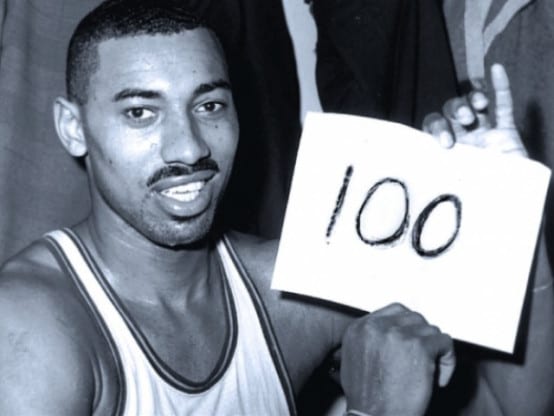
Wilt Chamberlain
Trailblazer
Abstract-Wilt Chamberlain (August 21, 1936-October 12,1999) was born in Philadelphia, Pennsylvania. Standing at 7’1, Chamberlain became one of the all-time greats for basketball. Through Wilt’s audacious attitude and individualistic mindset, Chamberlain embodies the American Dream through his trailblazing opinions in politics; as well as making a career for himself in a field where doing so was unheard of- as a Black American impacting the political scene through sports and campaigning for a republican candidate.
Wilt Chamberlain was born on August 21, 1936, in Philadelphia, Pennsylvania. Standing at 7’1, Wilt Chamberlain grew up playing high school basketball for three years, amassing 2,200 points and becoming a commodity for college basketball. Chamberlain was able to capture the attention of over 200 colleges before choosing Kansas University, where he reached phenom status. Though segregation existed at Kansas, Wilt describes his way of seeking justice by stating, “The best way to help integration is to live a good clean life.” Although many would claim that Chamberlain in fact did not live a good, clean life, as he said he had relations with over 20,000 women, the majority of his fans continued to hold him in high regard. Chamberlain is one of the more complex figures to follow for sports activism, yet his unique character allowed him to facilitate conversations that, without Chamberlain’s audacious attitude, would have gone neglected. Wilt Chamberlain embodies the American Dream through his trailblazing opinions in politics; as well as making a career for himself in a field where doing so was unheard of.
While at Kansas, Chamberlain was slightly confounded by the racial segregation of the city. Chamberlain decided that he would contest this by eating at all-white restaurants and surfacing near places where Black Americans were not allowed. This speaks to Chamberlain’s early form of activism as a silent, yet present leader whose example is prevalent for one to follow.
After a short stint with The Harlem Globetrotters, Wilt entered the National Basketball Association, or NBA. Wilt Chamberlain took the league by storm, capturing Rookie of the Year and Most Valuable Player in his first season, becoming a sensation. Before his career finished, Chamberlain won 2 national titles: one with the Philadelphia 76ers and subsequently with the Los Angeles Lakers. On March 2, 1962, Wilt Chamberlain made history with his infamous 100-point game, which is a record that will likely never be broken.
Throughout Chamberlain’s career, he continued to serve as an activist for Black Americans fighting for their rights. Notably, Chamberlain was not one of the outspoken athletes of his generation. He quietly supported the presidential campaign of Richard Nixon and wanted to help sway the Black American voters, who thought voting for the democrats was their only option at the time. Chamberlain was drawn to Nixon’s campaign because he felt that Nixon was also a loser, a strange yet sentimental theme in Chamberlain’s life. Additionally, Chamberlain was influenced greatly by Martin Luther King Jr., and he felt that he needed to do something in order to help garner votes for his friend and presidential candidate Richard Nixon. The two are seemingly an odd pairing, but Wilt thought saw this as a way for Black Americans to, “reach the mountaintop and see the promised land that Dr. King so often talked about.” Many Black Americans presumed that Nixon’s “law and order” policies were detrimental to them; however, Nixon used Chamberlain as his trailblazer, trying to change the opinions of those who resonate with Wilt. In Bill Libby’s book on Chamberlain entitled, “Goliath : The Wilt Chamberlain Story,” Chamberlain educates us on his natural tendency to be a trailblazer. Chamberlain proclaims, “I treasure my individualism above all my other traits. I hope to maintain it at the highest peak possible.” While many would question Chamberlains approach, it speaks volumes portraying how he led his life. Chamberlain, while endorsing Nixon, shares his opinion on picking the side you support; “If I feel a Richard Nixon is the best man to be president, I am going to support him, no matter what others say. I am not a fence-sitter.” Chamberlain was not one to call attention to himself, but when he made his voice heard, he was proud of that, proclaiming that “The thought of having a say in shaping society excited me.” Chamberlain was happy with having his opinion heard. He simply wanted to share with others what he thought was right and what he thought could help. Stating in his autobiography, written by Wilt Chamberlain and edited by David Shaw, entitled, “Wilt- Just Like Any Other 7-foot Black Millionaire Who Lives Next Door,” Wilt shares, “I didn’t get a penny for helping Richard, and I hoped to use my contact with him to help other Black Americans.”
Wilt Chamberlain passed away October 12, 1999. Bill Russell says that Wilt Chamberlain was a “complex, contradictory individual.” Although complex, Chamberlain was a trailblazer for Black Americans, if not for following his path, but for knowing there are other paths available unconforming to the patterns of their current society and even society today.
